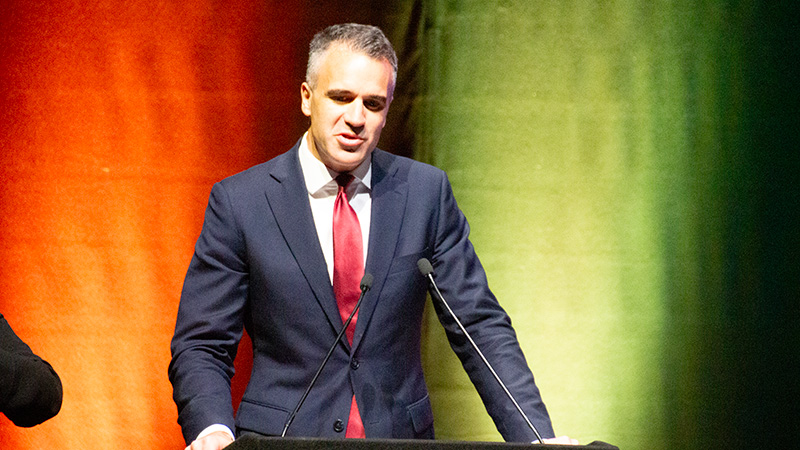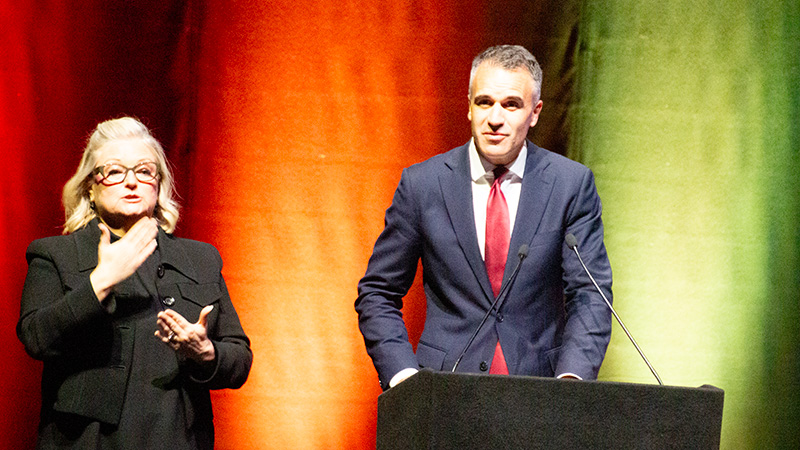South Australian Premier Peter Malinauskas reflected on the journey from the decriminalisation of homosexuality 50 years ago to today at the opening of the Better Together conference in Adelaide.
On Friday morning the premier was one of the first speakers at the opening plenary session of the grassroots LGBTIQA+ community conference, and he spoke about how he found himself thinking about the journey that state, and the country, has been on since the death of Dr George Duncan in 1972.
Malinauskas shared that he often likes to run along the riverside between his home and the city centre, a route that takes him past the foot bridge over the river where academic Dr George Duncan was killed.

Speaking to the hundreds of attendees at the Better Together conference the premier recounted one of South Australia’s darkest moments of history.
Dr George Duncan was a law academic at Adelaide University, in 1972 he was attacked and thrown into the River Torrens, where he drowned.
On the evening of the May 10 1972, Dr Duncan and another man, Roger James, were attacked by a gang of men, both were thrown into the river.
James suffered a broken ankle, but Duncan who was unable to swim drowned. James pulled himself from the river, and with the aid of a passing motorist was taken to hospital.
Shortly afterwards Dr Duncan’s body was discovered.
The public outrage over his death led to the push for the decriminalisation of homosexuality, and in 1975 South Australia became the first state or territory in Australia to change the laws. At the same time the state equalised the age of consent, making their laws world leading.
Malinauskas said the spot where the memorial to Dr George Duncan now stands is an important place in South Australia.
The premier shared that a few weeks ago as he ran past this spot on his journey home he noticed a couple, two young men, relaxing on the banks of the river.
“They were clearly enjoying on and others company, lying there, resting, chatting, in each other’s warm embrace. Just a perfectly normal display of affection and love.”
The premier said while it was a fleeting moment, but one that made him reflect on the changes that have occurred.
“Fifty years later, it’s a long time, fifty years later, here are two young fellas just relaxing and enjoying each other’s company, publicly showing affection and love to each other, without a care in the world.”
“It struck me that we have come a long way and the march of progress is on the side of decency of love.” Malinauskas said.

At the start of his speech Malinauskas acknowledged the traditional custodians of the Adelaide Plains, the Kaurna people, and said it was disappointing that recently Australia had seen a debate over such recognition at events.
“It’s frustrating that somehow Acknowledgement of Country has become controversial in our country. I think the majority of Australians appreciate and acknowledge the fact that we are pretty lucky to be living in a country that is home to the longest living culture in human history has ever known.”
Malinauskas said he was concerned about the growing discourse in society on a global level that seeks to portray diversity in a negative light.
“There is a movement of people who would seek to highlight diversity and points of difference amongst human beings for the purposes of dividing people, when it really feels though that the weight of momentum is to celebrate diversity in all its forms.” the premier said.
Malinauskas said he, like many people, could find times when the ongoing political debate could be depressing. “I find myself going down the rabbit-hole” he said, before urging people in those moments to take a bigg
“The march of human progress is on the side of those who want to look to one and other with compassion and basic human decency.” Malinauskas said, voicing his support for movements that bring people together.





